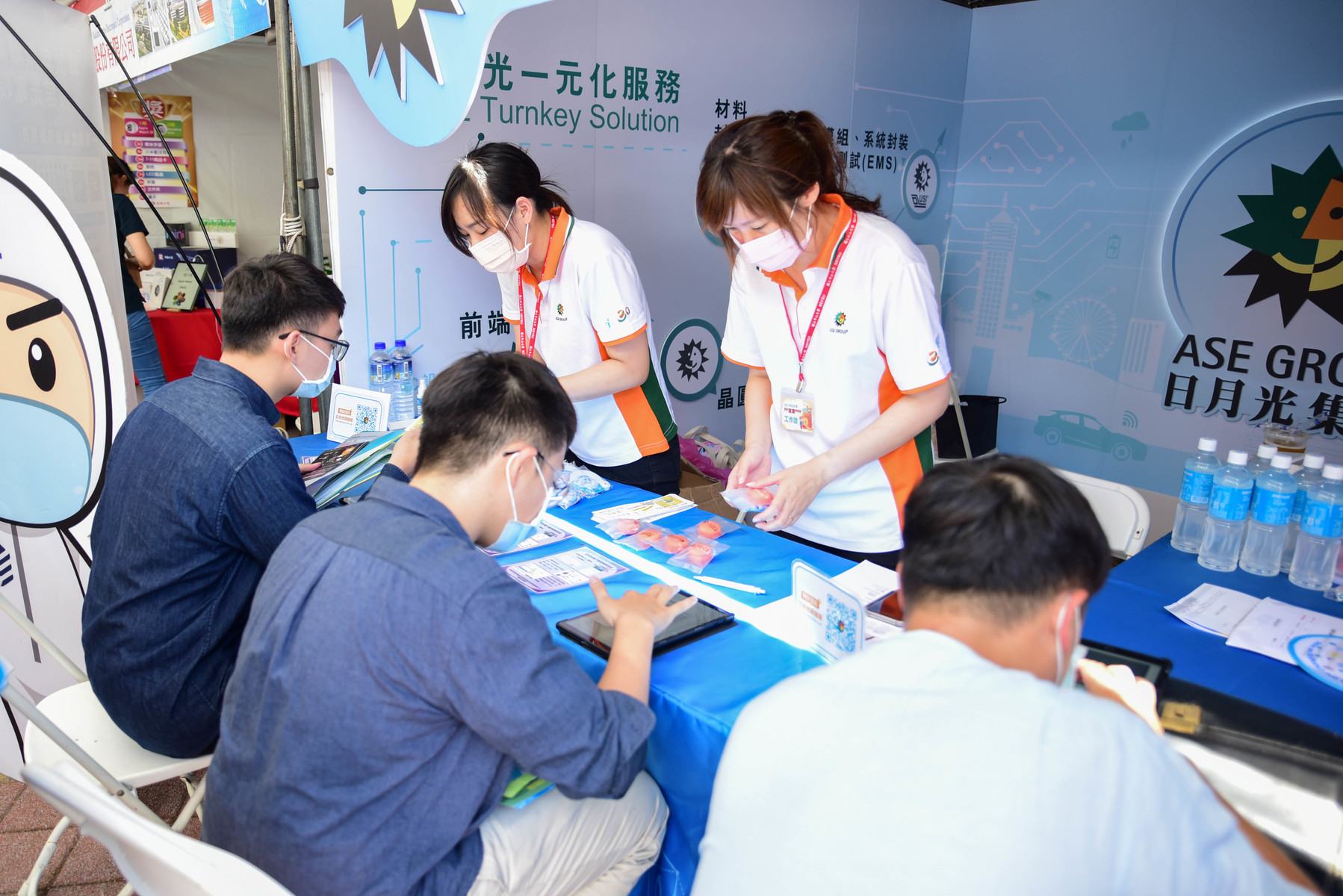Demand for internationalized talent in Taiwan increases



2021-05-31
(Report by student journalist) Many enterprises participating in this year’s National Sun Yat-sen University Job Fair reported a great demand for internationalized talent and focus on applicants’ English and Chinese language skills, such as Taiwan Cooperative Bank that joined the fair for the first time and looked for bilingual talents for its new bilingual branches established to respond to the government’s Bilingual Nation by 2030 Policy, as well as Fubon Financial, and companies of the screen industry, which looked for applicants with both expertise and foreign language abilities.
According to an official survey report by TOEFL, 62.1% of companies in Taiwan check applicants’ English proficiency during the recruitment process and 93.7% claim that their employees need to use English at work. Although companies have different English language proficiency requirements, the demand for internationalized talent has already become a trend of the future.
Taking the financial sector as an example, many banks have established bilingual demonstration banks in response to the government’s policy. Director of the Human Resource Department of Taiwan Cooperative Bank Kuo-Sheng Lan said that Taiwan Cooperative Bank has the most branches among banks in Taiwan and that by 2030 all of its branches will be bilingual. With 24 overseas branches, the Bank has a strong foothold abroad, and thus a significant demand for bilingual talent. Applicants’ bilingual abilities have been key for the Bank during recruitment at the Job Fair at NSYSU. Seeing that NSYSU is working towards the goal of becoming a bilingual university, he encouraged the students to make full use of the University’s resources and the study time to strengthen their bilingual skills, which will be a great asset when the future graduates will start their working life. The Sales Manager at Fubon Financial Chih-Wen Lin pointed out that although the insurance sector attaches importance to the individual’s professional sales skills, exceptional foreign language skills can let one promote overseas insurance when interacting with customers.
The technology industry also has a significant demand for bilingual talent. One interviewee working in the screen industry pointed out that the sector is in need of technology talents with English language abilities for R&D, product development, equipment manufacturing and for contacting overseas customers to ensure good equipment operation and transformation. His company established an R&D office overseas; one third of the delegated employees are Taiwanese and they need to communicate with US and Dutch colleagues in English for the R&D process and report to their superiors in English and thus, language abilities are key if one aims for a higher job position. The interviewee mentioned that NSYSU’s Department of Electrical Engineering, Department of Mechanical and Electro-Mechanical Engineering, and the Department of Chemistry establishing undergraduate courses taught entirely in English will help satisfy the industry’s future demand for bilingual talent.
“Interacting with enterprises and learning about employment trends let me realize the importance of learning English.” A fourth-year student of the Department of Political Economy Yu Tsai said that the financial sector usually requires applicants to achieve a TOEIC test score of about 600, while the technology sector – a score of 700 to 800 for management-level positions. He said that taking his undergraduate course in statistics in English has helped him greatly improve his TOEIC score. A sophomore of the Department of Computer Science and Engineering I Hsu pointed out that during the Job Fair he realized that basic English skills can help him negotiate with foreign customers, and that studying a master's program will involve reading lots of research papers in English and also, immersing himself in an English-speaking environment will naturally improve his basic English skills.
(Edited by Public Affairs Division)
(Report by student journalist) Many enterprises participating in this year’s National Sun Yat-sen University Job Fair reported a great demand for internationalized talent and focus on applicants’ English and Chinese language skills, such as Taiwan Cooperative Bank that joined the fair for the first time and looked for bilingual talents for its new bilingual branches established to respond to the government’s Bilingual Nation by 2030 Policy, as well as Fubon Financial, and companies of the screen industry, which looked for applicants with both expertise and foreign language abilities.
According to an official survey report by TOEFL, 62.1% of companies in Taiwan check applicants’ English proficiency during the recruitment process and 93.7% claim that their employees need to use English at work. Although companies have different English language proficiency requirements, the demand for internationalized talent has already become a trend of the future.
Taking the financial sector as an example, many banks have established bilingual demonstration banks in response to the government’s policy. Director of the Human Resource Department of Taiwan Cooperative Bank Kuo-Sheng Lan said that Taiwan Cooperative Bank has the most branches among banks in Taiwan and that by 2030 all of its branches will be bilingual. With 24 overseas branches, the Bank has a strong foothold abroad, and thus a significant demand for bilingual talent. Applicants’ bilingual abilities have been key for the Bank during recruitment at the Job Fair at NSYSU. Seeing that NSYSU is working towards the goal of becoming a bilingual university, he encouraged the students to make full use of the University’s resources and the study time to strengthen their bilingual skills, which will be a great asset when the future graduates will start their working life. The Sales Manager at Fubon Financial Chih-Wen Lin pointed out that although the insurance sector attaches importance to the individual’s professional sales skills, exceptional foreign language skills can let one promote overseas insurance when interacting with customers.
The technology industry also has a significant demand for bilingual talent. One interviewee working in the screen industry pointed out that the sector is in need of technology talents with English language abilities for R&D, product development, equipment manufacturing and for contacting overseas customers to ensure good equipment operation and transformation. His company established an R&D office overseas; one third of the delegated employees are Taiwanese and they need to communicate with US and Dutch colleagues in English for the R&D process and report to their superiors in English and thus, language abilities are key if one aims for a higher job position. The interviewee mentioned that NSYSU’s Department of Electrical Engineering, Department of Mechanical and Electro-Mechanical Engineering, and the Department of Chemistry establishing undergraduate courses taught entirely in English will help satisfy the industry’s future demand for bilingual talent.
“Interacting with enterprises and learning about employment trends let me realize the importance of learning English.” A fourth-year student of the Department of Political Economy Yu Tsai said that the financial sector usually requires applicants to achieve a TOEIC test score of about 600, while the technology sector – a score of 700 to 800 for management-level positions. He said that taking his undergraduate course in statistics in English has helped him greatly improve his TOEIC score. A sophomore of the Department of Computer Science and Engineering I Hsu pointed out that during the Job Fair he realized that basic English skills can help him negotiate with foreign customers, and that studying a master's program will involve reading lots of research papers in English and also, immersing himself in an English-speaking environment will naturally improve his basic English skills.
(Edited by Public Affairs Division)
Click Num:
Share
